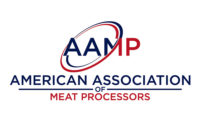Tuesday October 24th, 2017 was a good day for the American Association of Meat Processors. It was a day that had been in the planning stages for a long time from the AAMP side of things, as well as being highly anticipated. For the first time in quite a while, since before I came to work for the association, AAMP representatives traveled to Washington as an organization, not part of other industry meetings, and sat down with the leadership of FSIS for face-to-face talks on issues that are important to our members. Issues like humane handling enforcement, Revised Appendix A & B, labeling, interventions and testing and the relationships between inspection personnel and small plants. AAMP representatives also spent time in three Congressional offices on Capitol Hill discussing the same issues.
The first meeting of the day was with Acting FSIS Administrator Paul Kiecker and his leadership team. We discussed the issues and how we could partner with FSIS on some of those issues to ensure the long-term business success of small processors. The main priority for our meeting was to let FSIS know that we were willing to partner with them to both educate processors on regulatory requirements and to help facilitate regulatory change that will benefit small processors. We also wanted them to know that AAMP was willing to use our resources to protect our members from the actions of any regulatory agency that we feel targets small processors, either individually or collectively.
Good discussion was had on a number of topics. The hour-long meeting turned into an hour and forty minutes and we still did not cover everything, but we hit some really important ones. Here is a list of what we talked about:
1. Labeling Approvals: We discussed the length of time it takes for approvals as well as the inconsistency in interpreting the regulation between different reviewers.
2. PHIS and easier access for small plants: Having each plant on PHIS, which is what FSIS uses to record all inspection duties and information on the plant, would make it easier for plants to appeal NR’s and other actions.
3. Humane Handling: We addressed the over enforcement of the regulation and the inconsistency in what happens with a miss-stun. Why would a miss-stun be classified as an egregious act? We spoke of the number of plants stopping their slaughter operations, the negative effect that it is having on small farmers, and how that is a result of the frustration plants have with the regulatory process. FSIS realizes there is a problem and will look at ways to correct it through their district offices.
4. Revised Appendix A & B: We spoke to FSIS about our struggle to understand the need for the revision and the basis for it. We questioned the science behind the new revisions and also the number of samples required for a challenge and then ongoing support. I told FSIS that I have instructed our members to not make changes to their HACCP plans to meet the revised appendix until it is finalized because of the work it takes to validate the changes.
5. Relationship between FSIS, inspectors and plants: This was an area we touched on last and was touchy at best. We mentioned perceived intimidation, bullying and retaliation from inspectors. FSIS responded by wanting to know details, and I do not blame them. We need to provide them with information on the situations when they are happening; that is why it is important for you to document when something takes place and any witnesses to it. I need to present these issues to the district manager and to Washington, and then it becomes our responsibility to make sure it is dealt with. If we want to make these things stop, we must make them know we are serious and we have to hold them accountable. I need for you to be willing to step forward and speak, and trust us to have your back.
After our meeting with FSIS we headed for Capitol Hill where we spent the afternoon between three Congressional offices. Our first meeting was at the office of Congresswoman Vicki Hartzler of Missouri. We have been working with the Congresswoman and her staff on a number of initiatives for a while now and she has been a very helpful member of the House Agriculture Committee.
Our second meeting on the Hill was at the office of Congressman Mike Conaway of Texas, the Chairman of the House Agriculture Committee. We discussed our morning meeting with FSIS and the issues that our members have. Our last meeting of the day was with Congressman Glenn Thompson of Pennsylvania. He is the Vice Chairman of the House Agriculture Committee. We also spent time reviewing our meeting with FSIS and the needs of small processors.
I am pleased with the way our meetings went, and I think it is a good foundation for future conversations. I believe we must remain active now in reaching out to FSIS as well as the members of Congress and continue to expand AAMP’s circle of influence inside the beltway.






Report Abusive Comment